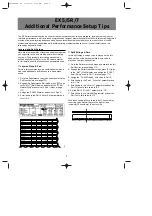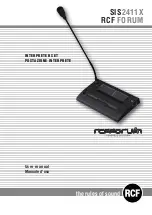
○
○
○
○
○
○
○
○
○
○
○
○
○
○
○
○
○
○
○
○
○
○
20•2 Reference Guide
○
○
○
○
○
○
○
○
○
○
○
○
○
○
○
○
○
○
○
○
○
○
20•2 Refer
ence Guide
the sample is played back at its originally record-
ed pitch, the D/A conversion will take place at
exactly the same rate as when the sound was
sampled. If you play a higher note, the sample is
converted at a higher rate, causing a rise in the
pitch and a shortening of the sound’s length.
Very simply, the WK3 sampler operates exactly
as described above.
If you want to know more about Sampling and
the techniques used, there is a great deal of spe-
cialised literature available on the subject.
ABOUT THE WK3 SAMPLER
WK3 incorporates a Sampler with the following
technical characteristics:
Sampling resolution
12 bit
High Frequency sampling
3 seconds (approx)
Low Frequency sampling
6 seconds (approx)
The sampling resolution is a measure of the ac-
curacy of the device, expressed in BITS, which
is a computer term meaning “power of 2”. The
resolution measures the number of different volt-
age levels that the device is capable of resolv-
ing.
The WK3 12 Bit sampler is able to resolve 2
12
different voltage levels = 4096.
High Frequency sampling for short, accurate sam-
ples lasting approximately 3 seconds.
Low Frequency sampling for longer samples (ap-
prox. 6 seconds) with a reduced quality with re-
spect to High.
The WK3 Sampler is capable of sampling sig-
nals (line or microphone) over a preselected
range (Split) of the keyboard. Up to 4 Splits can
be sampled. WK3 samples on any note C, de-
pending on the Split being edited. The sampling
note is the note which gives optimum playback
results of the sample. The sample is mapped
across the assigned split starting from a note C
but you can choose a different mapping note with
respect to the sample note.
You can regulate the sampling level of the signal
and set a dynamic trigger which applies a dy-
namic threshold below which the sampler does
not record.
The Mic/Line input signal is fed to the main mix
and regulated with the Mic/Line panel control and
processed by the on-board effects DSP.
The sample can be edited using macro-edit pa-
rameters similar to those used to edit sounds and
can be processed by the on-board effect DSP
units (Reverb and Effects).
You can assign the Sample to the pads and/or
any track. You cannot, however, edit a sample
further with the Sound Edit facilities.
the sample is played back at its originally record-
ed pitch, the D/A conversion will take place at
exactly the same rate as when the sound was
sampled. If you play a higher note, the sample is
converted at a higher rate, causing a rise in the
pitch and a shortening of the sound’s length.
Very simply
, the WK3 sampler operates exactly
as described above.
If you want to know more about Sampling and
the techniques used, there is a great deal of spe-
cialised literature available on the subject.
ABOUT THE WK3 SAMPLER
WK3 incorporates a Sampler with the following
technical characteristics:
Sampling resolution
12 bit
High Frequency sampling
3 seconds (approx)
Low Frequency sampling
6 seconds (approx)
The sampling resolution is a measure of the ac-
curacy of the device, expressed in BITS, which
is a computer term meaning “power of 2”. The
resolution measures the number of different volt-
age levels that the device is capable of resolv-
ing.
The WK3 12 Bit sampler is able to resolve 2
12
different voltage levels = 4096.
High Frequency sampling for short, accurate sam-
ples lasting approximately 3 seconds.
Low Frequency sampling for longer samples (ap-
prox. 6 seconds) with a reduced quality with re-
spect to High.
The WK3 Sampler is capable of sampling sig-
nals (line or microphone) over a preselected
range (Split) of the keyboard. Up to 4 Splits can
be sampled. WK3 samples on any note C, de-
pending on the Split being edited. The sampling
note is the note which gives optimum playback
results of the sample. The sample is mapped
across the assigned split starting from a note C
but you can choose a different mapping note with
respect to the sample note.
You can regulate the sampling level of the signal
and set a dynamic trigger which applies a dy-
namic threshold below which the sampler does
not record.
The Mic/Line input signal is fed to the main mix
and regulated with the Mic/Line panel control and
processed by the on-board effects DSP
.
The sample can be edited using macro-edit pa-
rameters similar to those used to edit sounds and
can be processed by the on-board effect DSP
units (Reverb and Effects).
You can assign the Sample to the pads and/or
any track. You cannot, however
, edit a sample
further with the Sound Edit facilities.
Summary of Contents for WK3 World Keyboard
Page 1: ......
Page 2: ......
Page 3: ......
Page 5: ......
Page 7: ......
Page 9: ......
Page 11: ......
Page 13: ......
Page 14: ... vi Introduction v ...
Page 15: ......
Page 17: ......
Page 19: ......
Page 21: ......
Page 23: ......
Page 25: ......
Page 27: ......
Page 29: ......
Page 31: ......
Page 33: ......
Page 35: ......
Page 37: ......
Page 39: ......
Page 41: ......
Page 43: ......
Page 45: ......
Page 47: ......
Page 49: ......
Page 51: ......
Page 53: ......
Page 55: ......
Page 57: ......
Page 59: ......
Page 61: ......
Page 63: ......
Page 65: ......
Page 67: ......
Page 69: ......
Page 71: ......
Page 73: ......
Page 75: ......
Page 77: ......
Page 79: ......
Page 81: ......
Page 83: ......
Page 85: ......
Page 87: ......
Page 89: ......
Page 91: ......
Page 93: ......
Page 95: ......
Page 97: ......
Page 99: ......
Page 101: ......
Page 103: ......
Page 105: ......
Page 107: ......
Page 109: ......
Page 111: ......
Page 113: ......
Page 115: ......
Page 117: ......
Page 119: ......
Page 121: ......
Page 123: ......
Page 125: ......
Page 127: ......
Page 129: ......
Page 131: ......
Page 133: ......
Page 135: ......
Page 137: ......
Page 139: ......
Page 141: ......
Page 143: ......
Page 145: ......
Page 147: ......
Page 149: ......
Page 151: ......
Page 152: ... 8 8 User Guide 8 ...
Page 153: ......
Page 155: ......
Page 157: ......
Page 159: ......
Page 161: ......
Page 163: ......
Page 165: ......
Page 167: ......
Page 169: ......
Page 171: ......
Page 173: ......
Page 175: ......
Page 177: ......
Page 178: ... Reference Guide ...
Page 179: ......
Page 181: ......
Page 183: ......
Page 185: ......
Page 186: ... 12 8 Reference Guide 1 ...
Page 187: ......
Page 189: ......
Page 191: ......
Page 193: ......
Page 195: ......
Page 197: ......
Page 199: ......
Page 201: ......
Page 203: ......
Page 205: ......
Page 207: ......
Page 209: ......
Page 211: ......
Page 213: ......
Page 215: ......
Page 217: ......
Page 219: ......
Page 221: ......
Page 223: ......
Page 225: ......
Page 227: ......
Page 229: ......
Page 231: ......
Page 232: ... 14 10 Reference Guide 1 ...
Page 233: ......
Page 235: ......
Page 237: ......
Page 239: ......
Page 241: ......
Page 243: ......
Page 245: ......
Page 247: ......
Page 249: ......
Page 250: ... 16 12 Reference Guide 1 ...
Page 251: ......
Page 253: ......
Page 255: ......
Page 257: ......
Page 259: ......
Page 261: ......
Page 263: ......
Page 265: ......
Page 267: ......
Page 269: ......
Page 271: ......
Page 273: ......
Page 275: ......
Page 277: ......
Page 279: ......
Page 281: ......
Page 283: ......
Page 285: ......
Page 287: ......
Page 289: ......
Page 291: ......
Page 293: ......
Page 295: ......
Page 296: ...Appendix ...
Page 297: ......
Page 299: ......
Page 301: ......
Page 303: ......
Page 305: ......
Page 307: ......
Page 309: ......
Page 311: ......
Page 313: ......
Page 315: ......
Page 317: ......
Page 319: ......
















































